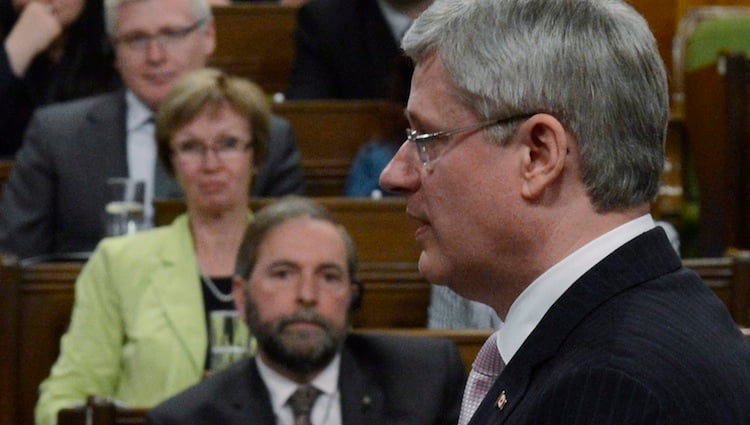Who takes Question Period seriously? Stephen Harper
Before the team takes the field, there is practice
Adrian Wyld/CP
Share

In 14 Days, his new book about his work behind the scenes of federal politics, Bruce Carson recalls an innovation the Conservatives brought to government when they took office in 2006: Question Period practice.
While in opposition, everyone who was going to be involved or asking questions in QP was required to attend a practice held daily at 1 p.m. Harper was always there, as was Jason Kenney, the question period co-ordinator. Why not do the same every day with ministers and parliamentary secretaries? Thus began one of the major innovations that we brought to government: the daily question period practice. Attendance was mandatory, and the prime minister always attended when he was in Ottawa. Chaired by the government House leader, the questions were put to the cabinet minister by the issues manager, initially Keith Beardsley and then Jenni Byrne … This was new: the Liberals never did this. It became one of the best hours of each day. Every issue the government faced was hashed out here, with the prime minister and senior staff in attendance.
This does seem to have been a change: the Liberals held a daily meeting, but it doesn’t seem to have amounted to a full QP practice. The Harper government’s approach seems more similar to what you might imagine a football team going through before a game.
Possibly you’ll think it funny that it takes a great deal of preparation to stand in the House of Commons and not answer questions. I raise it mostly to point out that for all the derision that is heaped on Question Period, it is not a treated as a trivial matter by the participants (the NDP also conducts a daily QP practice).
There’s a good argument that this is a waste of time. We could move to a rotation whereby only certain ministers are expected to face questions in the House each day, perhaps with the Prime Minister expected on Wednesdays—a system that was part of Michael Chong’s proposal to reform Question Period. To any concern that this might limit the ability of the House to shout at a minister on the occasion of a new controversy, there’s another change that might be adopted: copying the UK’s Urgent Question.
Here is the official explanation from Westminster.
If something has happened which an MP believes requires an immediate answer from a Government Minister, they may apply to ask an urgent question. If the Speaker (or in the House of Lords the Lord Speaker) agrees that the matter is urgent and important, the question will be asked at the end of question time.
Applications for urgent questions must be submitted to the Speaker to receive an oral answer on the same day. Relevant interests must also be declared. The relevant Government department will be asked to provide a background briefing on the issue for the Speaker. Urgent questions are asked straight after question time on Monday to Thursday. If an urgent question is asked on a sitting Friday then the question will be asked at 11am.
The use of this procedure is, I take it, one of Speaker John Bercow’s primary contributions.
The increased intensity and speed that an e-democracy demands will travel beyond just one form of representation. It will and should have an impact on what and how we choose to debate. The single biggest change at Westminster with which I have been linked is the revival of the Urgent Question. The UQ is a device which allows any MP to petition me at the start of a parliamentary day to compel a minister to come to the chamber and answer an enquiry on an issue which has suddenly emerged. In the year before I became Speaker only two UQs were accepted and the instrument was dying. In my time in the Chair I have allowed numerous Urgent Questions and Parliament is much the more topical and hence more relevant for it.
In the meantime, we might at least demand that, with all that time spent getting ready each day, everyone should be expected to be able to deliver their questions and responses without reading.